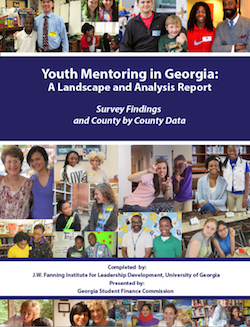A new report on mentoring and youth development programs in Georgia, released by the UGA J.W. Fanning Institute for Leadership Development, is establishing benchmarks that can serve as a tool to better meet the needs of Georgia’s youth.
The 2017 Youth Mentoring in Georgia Report, a statewide collaboration between the Fanning Institute, the Georgia Student Finance Commission (GSFC), and MENTOR: The National Mentoring Partnership, provides an overview of the state of mentoring and youth development in Georgia.
This survey gathered information from 186 mentoring and youth development organizations around the state about their characteristics, goals, budgets and funding sources, and the characteristics of the youth they serve.
It identified both “bright spots” and “red flags” in the mentoring landscape in Georgia, as well as possible opportunities to grow mentoring programs in the state.
The GSFC engaged the Fanning Institute to manage the project and facilitate the report’s distribution.
Working on the report from the Fanning Institute were Public Service Associate David Meyers and Senior Public Service Associate Jenny Jordan.
“Our hope is to take this information and improve the state of mentoring in Georgia,” said Meyers.
He added that it has been some time since a report like this was done on mentoring in the state.
In addition, Jordan noted that this survey reached both traditional mentoring organizations and other groups that do not fall in that category but are still providing those types of services.
“We opened the landscape up,” said Jordan. “It really expanded the pool of people you are talking to.”
On February 28, the report was unveiled at a meeting at Chick-fil-A Corporate Offices in Atlanta to around 200 stakeholders.
Meyers said everyone was excited to come together to talk about the report.
“People are thirsty for connection,” said Meyers.
He said the report and its release brought out a desire from mentoring organizations for more connectivity and sharing of information among themselves.
Meyers said those organizations expressed interest in looking at ways to partner and affiliate with other state and national-level mentoring organizations.
Also, Jordan said those in attendance submitted comments as part of the report’s release, and those responses are being compiled as the team that put the report together looks at next steps.
“We wanted it to be an engaged experience,” said Jordan.
The GSFC requested the survey as part of efforts to grow Realizing Educational Achievement Can Happen (REACH), a needs-based mentorship and college scholarship program established by Governor Deal in 2012 and administered by the GSFC.

